Papers by Roschanack Shaery
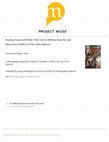
Anthropological Quarterly, 2021
This article contributes to the emerging subfield of biohistory by exploring
the nexus of forensi... more This article contributes to the emerging subfield of biohistory by exploring
the nexus of forensic science and politics through an analysis of a mass
grave exhumation in postwar Lebanon. In late 2005, a few months after the Syrian army’s withdrawal from Lebanon, the Lebanese army unearthed a mass grave, carried out DNA analysis, and identified the bodies of several soldiers whose families had long claimed that their sons had been abducted in 1990 and subsequently held in detention across the border in
Syria. Focusing on the mysterious fate of these soldiers, I use oral history,
archival documents, and ethnographic materials to explore how Lebanese
national institutions relied on forensic DNA identification to produce hegemonic narratives that sidelined the demands of the victims’ families for more investigation and care. I demonstrate the overlap between forensic science, national security, and the army as an organ of the state, and I argue that DNA identification tests helped the Lebanese army erase traces of its decades-long collaboration with Syrian military security by allowing it to present the families’ claims of illegal cross-border transfers of abductees and their corpses as examples of irrational or wishful thinking and as a psychological coping mechanism on the part of suffering mothers. The exhumation of the mass grave thus did not promote national solidarity against “foreign occupation,” nor did it have a cathartic effect by helping people deal with a silenced past. Instead, forensic science supported a continuation of silence about past violence. [Keywords: Biohistory, forensic science, mass graves, enforced disappearance, Syrian military security, Lebanese civil war]
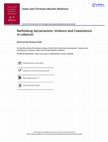
Islam and Christian Muslim Relations, 2020
Drawing on ethnographic fieldwork in Lebanon and analysis of Lebanese media, this article argues ... more Drawing on ethnographic fieldwork in Lebanon and analysis of Lebanese media, this article argues that sectarianism is a cultural practice that posits a necessary link between religious identity and intentions. The resulting sectarian hermeneutics leads both ordinary Lebanese citizens discussing political events and acts of violence and participants in interconfessional dialogue sponsored by the state or by NGOs to assume that individuals’ intentions can be reliably inferred from their official religious status within Lebanon’s confessional system. The article explores activities promoting interreligious dialogue in Lebanon and shows that, in postwar Lebanon, sectarianism and anti-sectarianism, far from being antithetical to one another, in fact share an underlying logic. Both are preoccupied with defining a fixed relationship between religion and politics and between religion and violence. As a result, anti-sectarianism reproduces the understanding of identity and action as determined by religious sect that underpins the sectarian discourse it purports to combat. In so doing, it sidelines the state’s responsibility for social and economic inequality between religious communities.
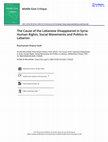
Middle East Critique, 2020
In 1989 SOLIDE, a grass root movement from within the right wing Christian opposition to the Syri... more In 1989 SOLIDE, a grass root movement from within the right wing Christian opposition to the Syrian military security emerged in order to campaign for the recovery of the disappeared. Drawing on oral history, interviews, fieldwork at SOLIDE's protest tent in downtown Beirut, and documentary analysis, I trace the genealogy and politics of SOLIDE's activism from the late 1980s to the present, showing that SOLIDE's activism underwent profound changes in response to Lebanese political developments. Beginning as an avowedly political campaign, in the aftermath of the war it turned into a human rights-focused NGO, a shift that was only possible because of an alliance with a group of the mothers of the disappeared; gender stereotyping enabled SOLIDE to present itself as fundamentally apolitical. With the establishment of a protest tent in downtown Beirut in 2005, in the period after the Syrian withdrawal until the end of its sitin in 2015, SOLIDE took on the characteristics of a social movement. Analysis of the various phases of activism demonstrates that in Lebanon the boundaries between humanitarianism, often of religious inspiration, and human rights activism, supposedly secular, are porous, as too the boundary between party-political activism and civil society.
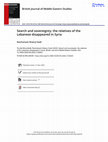
BRISMES, 2020
During almost three decades of Syrian army presence in Lebanon, the Syrian military security in c... more During almost three decades of Syrian army presence in Lebanon, the Syrian military security in collaboration with local militia leaders and with the blessing of many postwar politicians abducted and transferred hundreds of Lebanese and Palestinians illegally across the border to Syria. Based on interviews with the relatives of these victims and on participant observation at the permanent sit-in at the protest tent in downtown Beirut where they regularly gathered, I discuss the search practices of these families since the early 1980s. I throw light on several of their activities to resist the political, legal, and public erasure of these disappeared. I suggest that relatives have acted as ‘informal lawyers’ of the absentees to protect them from being blamed for their own abductions. Furthermore, I argue that after the Syrian army withdrawal in 2005 there has been a clear transition from what Thomas Blom Hansen calls the de facto sovereignty of transnational shadow networks (such as in this case of Syrian and Lebanese military security) to the de facto sovereignty of global humanitarian and human rights regimes. I claim that members of both of these transnational networks engage in a set of discourses and practices to decide over the life and death of these victims.
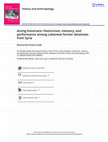
History and Anthropology, 2019
The nascent subfield of the anthropology of history criticizes the historicist bent of Western hi... more The nascent subfield of the anthropology of history criticizes the historicist bent of Western historiography and calls for attention to alternative historicizing practices, especially non-Western ones. Drawing on ethnographic fieldwork in Beirut, I argue that former Lebanese and Palestinian detainees held in Syria have developed a range of such practices in order to have their testimonies about their detention taken seriously in Lebanon. Against a background of institutionalized amnesia and deep political and sectarian divisions, the state refuses to treat them as political detainees. Other publics are more sympathetic, but the ability of exdetainees to persuade them is limited by these audiences' historicist presuppositions, particularly their expectations that detainees' accounts rely on a linear chronology with a clear progression from past to present and that detention narratives provide evidence that can be critically compared and corroborated. In this regard they also implicitly reject the model, bequeathed by the Holocaust, of the inarticulate victim as guarantor of a testimony's authenticity. Consequently, the anthropology of history should resist the temptation to map historicist and non-historicist forms of history onto a West/non-West split.

Genealogies—representations of kinship and narratives of origin—are in the transnational Shi'ite ... more Genealogies—representations of kinship and narratives of origin—are in the transnational Shi'ite world intimately connected to politics of piety, the production of nationalism, and struggles over authority. In this essay, I am concerned with certain inflections in the links between genealogy and piety that make these terms central to contests over notions of territoriality in contemporary Shi'ite politics. Nationalism replaces the sovereignty of God with the exclusive sovereignty of a " people " over a clearly demarcated territory, but religious language, identifications, and imagery often play prominent roles in how the imagined community of the nation is fashioned and delimited. Here I will show how, mediated through genealogy, religious leaders and pious movements with transnational ties produce religious authority, and create links to territory, to assert themselves as exemplary cultural citizens. The Middle East is now characterized by the rise of influential and popular Islamist movements. To better understand the conflicts and allegiances that the region's state and non-state actors forge with each other and with Western powers, we must analyze how pious movements operate and create national identities within the realities of the nation-states era. Equally important is how they produce these identities in light of their transnational ties, and their rhetoric that the region's nation-states are arbitrary creations of colonial powers.
The year 1979 was among the most tumultuous, and important, in the history of the modern Middle E... more The year 1979 was among the most tumultuous, and important, in the history of the modern Middle East. The Middle East Institute will mark the 30 th anniversary of these events in 2009 by launching a year-long special series of our acclaimed publication, Viewpoints, that will offer perspectives on these events and the influence which they continue to exert on the region today. Each special issue of Viewpoints will combine the diverse commentaries of policymakers and scholars from around the world with a robust complement of statistics, maps, and bibliographic information in order to encourage and facilitate further research. Each special issue will be available, free of charge, on our website, www.

Recent debates on the role of new media in the Muslim world have coalesced around two major argum... more Recent debates on the role of new media in the Muslim world have coalesced around two major arguments. In the first line of research, some scholars argue that the emergence of new media has led to more transparency as well as to a democratization of sacred knowledge since new actors have emerged who interrogate the authority of traditional Muslim leadership. 1 Addressing the relationship between new media and authority, other scholars have argued that there is no necessary relation between the advent of new media and political liberalization, 2 and that new media often has been used in ways that help consolidate the power of authoritarian states. 3 In the second line of argument, following more Foucauldian themes, scholars argue that new media practices create new forms of subjectivity and discipline and therefore question the assumed democratizing character of new media. 4 In this second line of argument, media technology itself has no inherent links to particular social or political consequences, but what is of interest is how this technology becomes absorbed in particular cultural and political contexts and plays a prominent role for its users as a means to realize their aspirations. Despite the limited success of activists in the Middle East to create a more pluralistic form of public sphere through the use of the new media, civil society activists and political dissidents continue to view the Internet as an important tool in their resistance against oppressive regimes and argue that it is often their only available medium to
Books by Roschanack Shaery
Caring Violence. Syrian Authoritarianism and Enforced Disappearances in Lebanon , 2025
Caring Violence contributes to the nascent field of the Anthropology of history by focusing on st... more Caring Violence contributes to the nascent field of the Anthropology of history by focusing on state violence and border practices between Lebanon and Syria. It tells the histories that Syrian officers, Lebanese politicians, bystanders, and the victims of violence produce as they torture, collaborate, and suffer while moving back and forth across the borders.


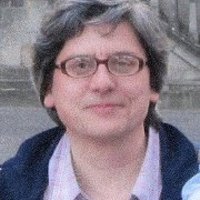


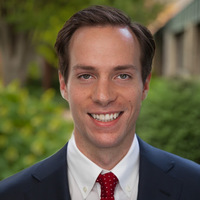



Uploads
Papers by Roschanack Shaery
the nexus of forensic science and politics through an analysis of a mass
grave exhumation in postwar Lebanon. In late 2005, a few months after the Syrian army’s withdrawal from Lebanon, the Lebanese army unearthed a mass grave, carried out DNA analysis, and identified the bodies of several soldiers whose families had long claimed that their sons had been abducted in 1990 and subsequently held in detention across the border in
Syria. Focusing on the mysterious fate of these soldiers, I use oral history,
archival documents, and ethnographic materials to explore how Lebanese
national institutions relied on forensic DNA identification to produce hegemonic narratives that sidelined the demands of the victims’ families for more investigation and care. I demonstrate the overlap between forensic science, national security, and the army as an organ of the state, and I argue that DNA identification tests helped the Lebanese army erase traces of its decades-long collaboration with Syrian military security by allowing it to present the families’ claims of illegal cross-border transfers of abductees and their corpses as examples of irrational or wishful thinking and as a psychological coping mechanism on the part of suffering mothers. The exhumation of the mass grave thus did not promote national solidarity against “foreign occupation,” nor did it have a cathartic effect by helping people deal with a silenced past. Instead, forensic science supported a continuation of silence about past violence. [Keywords: Biohistory, forensic science, mass graves, enforced disappearance, Syrian military security, Lebanese civil war]
Books by Roschanack Shaery
the nexus of forensic science and politics through an analysis of a mass
grave exhumation in postwar Lebanon. In late 2005, a few months after the Syrian army’s withdrawal from Lebanon, the Lebanese army unearthed a mass grave, carried out DNA analysis, and identified the bodies of several soldiers whose families had long claimed that their sons had been abducted in 1990 and subsequently held in detention across the border in
Syria. Focusing on the mysterious fate of these soldiers, I use oral history,
archival documents, and ethnographic materials to explore how Lebanese
national institutions relied on forensic DNA identification to produce hegemonic narratives that sidelined the demands of the victims’ families for more investigation and care. I demonstrate the overlap between forensic science, national security, and the army as an organ of the state, and I argue that DNA identification tests helped the Lebanese army erase traces of its decades-long collaboration with Syrian military security by allowing it to present the families’ claims of illegal cross-border transfers of abductees and their corpses as examples of irrational or wishful thinking and as a psychological coping mechanism on the part of suffering mothers. The exhumation of the mass grave thus did not promote national solidarity against “foreign occupation,” nor did it have a cathartic effect by helping people deal with a silenced past. Instead, forensic science supported a continuation of silence about past violence. [Keywords: Biohistory, forensic science, mass graves, enforced disappearance, Syrian military security, Lebanese civil war]